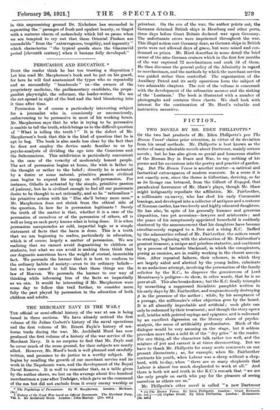PERSUASION AND EDUCATION. * Doss the reader think he has
too trusting a disposition ? Let him read Mr. Macpherson's book and be put on his guard, for here he will find anatomized the types who so repeatedly and so successfully " bamboozle " us—the owners of the proprietary medicine, the parliamentary candidate, the propa- gandist playwright, the reformer, the leader-writer. We see the net spread in sight of the bird and the bird blundering into it time after time.
Persuasion is of course a particularly interesting subject for a journalist who is, consciously or unconsciously, endeavouring to be persuasive in most of his working hours. Mr. Macpherson says that he who is trying to be persuasive is unable to tell the truth, which brings us to the difficult question of " What is telling the truth ? " It is the defect of Mr. Macpherson's book that this is the kind of question that he is apt to beg. The book is also made less clear by the fact that he does not employ the device made familiar to us by psycho-analysts of dividing the ego into the Conscious and the Subconscious. This subdivision is particularly convenient in the case of the veracity of moderately honest people. The act of persuasion begins at home, the wish is father to the thought or rather to the belief ; directly he is actuated by a desire or some natural, primitive passion civilized man begins to expend his energy on self-persuasion. For instance, Othello is actuated by the simple, primitive passion of jealousy, but he is civilized enough to feel all our passionate desire to be thought to act rationally, and so he " rationalizes " his primitive action with his " Else she'll betray more men." Mr. Macpherson does not shrink from the ethical side of the question, In how far is persuasion legitimate ? Surely the truth of the matter is that, whether it is a case of the persuasion of ourselves or of the persuasion of others, all is well as long as each party knows what is being done. It is when persuasion masquerades as cold, impartial logic or a simple statement of facts that the harm is done. This is a truth that we are beginning to realize, particularly in education, which is of course largely a matter of persuasion. We are realizing that we cannot avoid dogmatizing to children or students, but what we can avoid is making them think that our dogmatic assertions have the weight of eternal, immutable fact. We persuade the learner that it is best to conform to the ordinary habits of society—even to its ordinary beliefs—
but we have ceased to tell him that these things are the law of Heaven. We persuade the learner to our way of thinking while informing him of the facts as impartially as we can. It would be interesting if Mr. Macpherson were some day to follow this trail further, to consider more fully the part played by persuasion in the education of both children and adults.


































 Previous page
Previous page